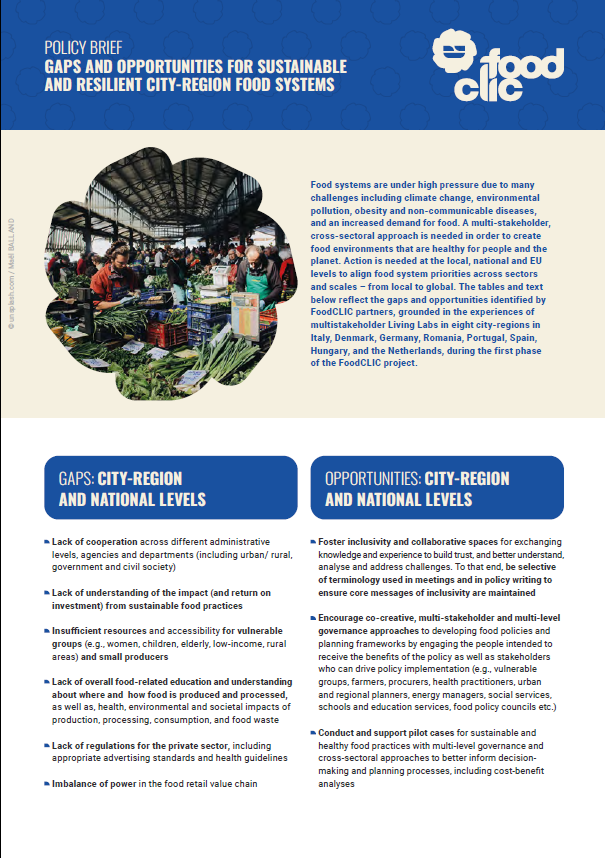Gaps and opportunities for sustainable and resilient city-region food systems
Discover how we can build a sustainable food environment for both people and the planet, guaranteeing food security for everyone. In this article, you will find the recommendations coming from 8 local Living Labs in Europe.
To create food environments that are healthy for both people and the planet, a multi-stakeholder and cross-sectoral approach is essential. We need action at local, national, and EU levels to align food system priorities across sectors and scales. In this policy brief from the FoodCLIC project, Anna Bruen (ICLEI Europe, involved also in the FOODPathS project) presents insights gained through 8 Living Labs acting at local level in Italy, Denmark, Germany, Romania, Portugal, Spain, Hungary, and the Netherlands.

As gaps, the living labs has identified the lack of cooperation across different administrative levels, poor understanding of the impact of sustainable food practices, and insufficient resources for vulnerable groups and small producers. Additionally, there is a significant lack of overall food-related education, inadequate regulations for the private sector, and misalignment of food-related policies across scales. Local authorities also face challenges in accessing EU funding for implementing food-related policies and projects.
To address these challenges, the policy brief highlights several opportunities. It emphasizes the need for fostering inclusivity and collaborative spaces for knowledge exchange and trust-building. Moreover, it highlights that encouraging co-creative, multi-stakeholder governance approaches in developing food policies is crucial. Supporting pilot projects for sustainable food practices and promoting local production through permissive legislation and benchmarks are also recommended. Furthermore, policies should encourage healthy eating habits, develop community-led food infrastructures such as urban gardens and farmers market, and include food justice indicators in policy monitoring. Integrating food-related topics into broader policies on resilience, circular economy, and climate change is essential for creating synergies between social, economic, and environmental sustainability goals.
In conclusion, transforming food systems into sustainable and resilient ones requires collaboration, inclusive policymaking, and the integration of food priorities into broader policies. In addition to this, the policy brief identifies the need of investments in science-policy-society relationships and local innovation, as well as the creation of a comprehensive legal framework for sustainable food systems across the EU.
The full version of the policy brief is available here.
About FoodCLIC
The EU-funded FoodCLIC project aims to bring together people and policies from different sectors for an integrated approach to transforming urban food environments and food systems. More information here.